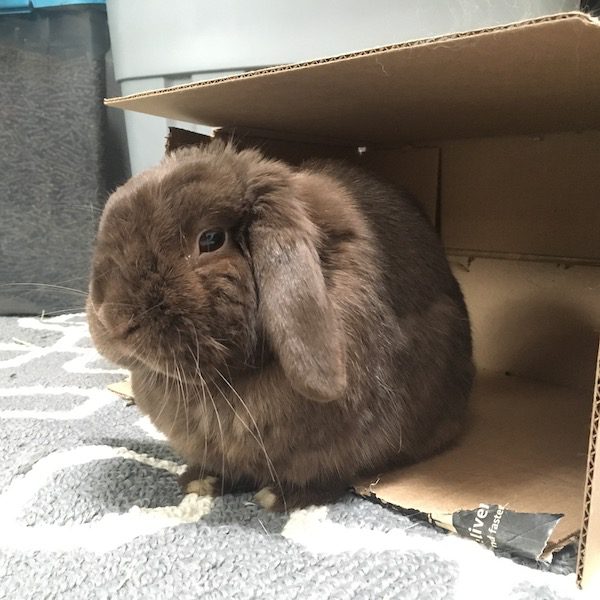
by Katie McGee, DVM
Please note: this blog post is from 2019, and Dr. McGee has unfortunately moved out of state and so is no longer with us. After her departure, Ann Arbor Animal Hospital does not treat rabbits or any exotics; we recommend All Creatures Animal Clinic to owners of rabbits or exotics needing veterinary care.
Your local shelter or humane society doesn’t just have cats and dogs! Have you considering bringing a rabbit into your family?
Rabbit adoption
While there are rabbit breeders and classified ads with cute rabbits for sale, consider that local adoption facilities are often in need of new rabbit parents as well. Rabbits are a common Easter gift for children, for example, but unfortunately a lot of those cute little gifts end up in a shelter. These facilities often spay and neuter rabbits and educate new families on responsible care. Their goal is to find forever families for rabbits and ultimately, to set you up for success with your bunny.
Your adoption fee at these places will be well worth it. The staff can help you decide if a rabbit is right for your family. Then they can introduce you to their fun personalities and help you find the right one.
Find local rabbits that need a loving home:
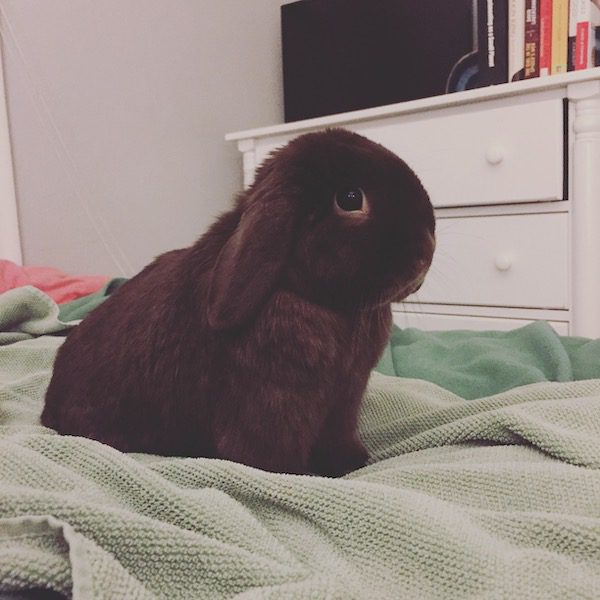
Meet Lincoln McGee. I adopted him from the Humane Society of Utah in 2018. He made the big move to Ann Arbor with me, my husband Tyler, Charlotte the chihuahua, and Simon the cat. This move was for Tyler to pursue his postdoctoral career in geology at the University of Michigan. It also made it possible for me to practice at Ann Arbor Animal Hospital!
Is a rabbit right for you or your family?
Rabbits like to interact on their own terms and take some time to warm up to you. They are fun pets to feed vegetables and watch them play. They love to chew on things and need straw toys, cardboard, and hay always available to avoid undesirable chewing.
Over time, rabbits will interact with their family as they become more comfortable. Most rabbits don’t love to be snuggled, held on their backs or picked up all the time. They need space and time to get to know you.
It is important to consider your other pets and to cautiously introduce other pets under supervision. While rabbits are prey to many other species, they are surprisingly dominant even around cats and dogs: my rabbit, Lincoln, rules the house over her cat, Simon, and Chihuahua, Charlotte.
Unless you meet a “bonded pair” of rabbits in the shelter, rabbits often do NOT want a rabbit sibling. In fact, they are very territorial and will often fight aggressively if a new rabbit is introduced. Take direction from your adoption facility or veterinarian if you are thinking of adopting more than one rabbit or introducing new rabbits.
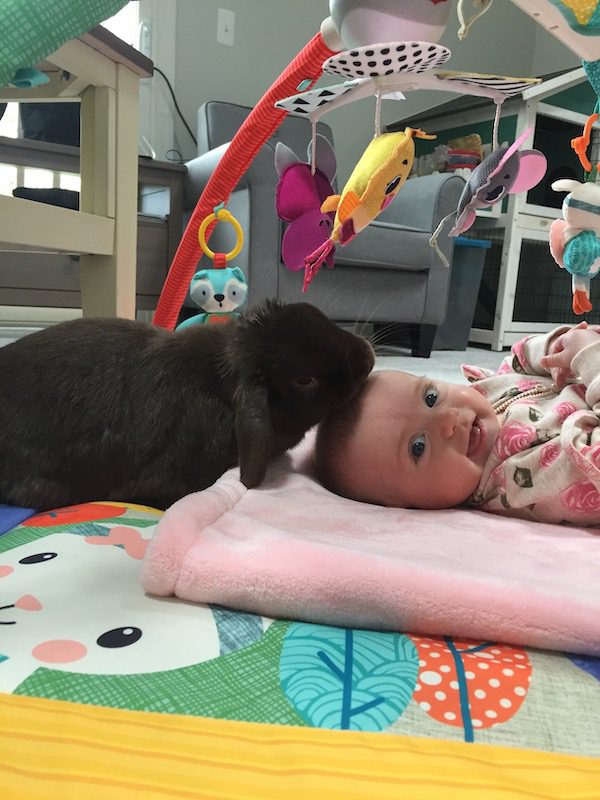
Lincoln has become an exceptional snuggler. He can’t help himself when it comes to licking babies or snuggling after his exercise time. He has the gift of a new human baby sister, Willow McGee.
Husbandry
About 90% of a rabbit’s diet should be good quality Timothy hay, available at all times. This helps maintain their oral health and keep their intestinal tract functioning properly.
They can have ⅛-¼ cup of pellets per day. (Other cereals or dyed material with the pellets is not necessary, and in fact is not good for rabbits.) They can also have cups of vegetables, including various lettuces, kale, and other greens. If your rabbit has not had many vegetables, it is important to introduce new foods slowly and one-by-one. Rabbits are also a convenient consumer of your vegetable peels and scraps that would normally go into the compost bin.
Rabbits love to be active and they deserve a cage that is big enough to hop around in. They do best with some time each day (an hour or more) to play in an open room or space that has been adequately rabbit-proofed. Once they warm up to you, they’ll even let you and other pets participate. Make sure wires for electronics and any other hazards are not accessible.
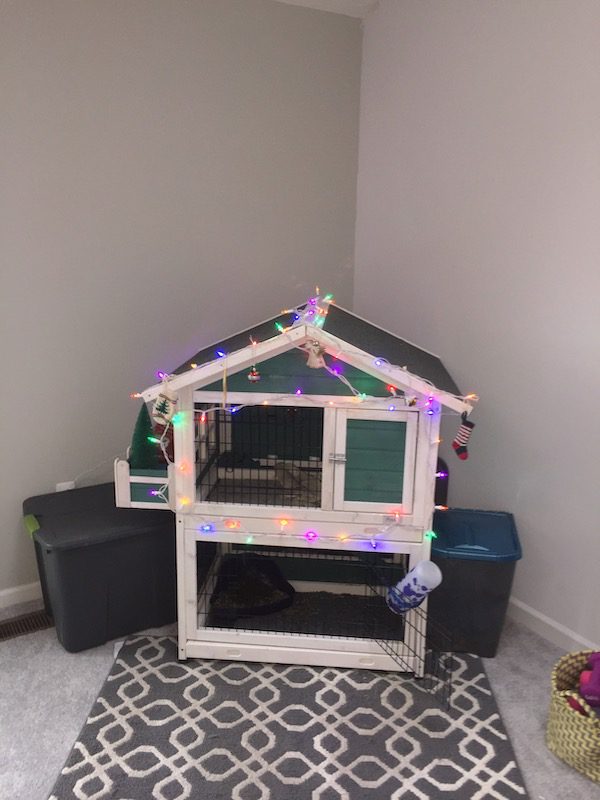
An indoor two-story rabbit house, festively decorated.
Rabbits are extremely sensitive to heat and humidity. If housed outdoors, they should be in complete shade and taken to a cooler environment on extremely hot or humid days. Rabbits tolerate cold much better, but it is recommended to get them indoors when the outdoor temperature is sub-zero.
There is actually a “right” way to pick up a rabbit to avoid injuries. The video below includes a quick demo on the recommended “football hold” for rabbits.
Veterinary care for your family rabbit
Just like our cats and dogs, rabbits should have an annual exam with a veterinarian. I also highly recommend an initial consult for a new adopted pet rabbit. It is important to discuss diet, exercise, and home-care. It is imperative to evaluate rabbits for their condition, their oral health, and assess them for conditions that can arise with age.
Getting your rabbit spayed or neutered is extremely important. This is recommended around 4-6 months of age at the earliest, but can happen later in life.
Uterine cancer is very common in females—about 80% of females older than 4 years of age will develop uterine cancer, which has a major effect on their life span. This is preventable by spaying rabbits when they are young and otherwise healthy.
Male rabbits are also prone to testicular tumors if they remain intact.
Spaying and neutering has additional benefits of aiding in litter box training and reducing aggression. Check this link for more information on the benefits of spay/neuter and the logistics of surgery day.
Schedule a consult with a veterinarian to discuss your rabbit’s physical exam, anesthetic risks, and answer any questions you may have. Your vet may do spays and neuters for rabbits as well as wellness visits, and may also see emergencies.
If you happen to be outside of the Ann Arbor area, check out the House Rabbit Society’s list to find rabbit veterinarians by state or country.
Rabbit emergencies
While a vet would prefer to see your bunny at a routine visit aimed at preventive health, they can also help your bunny when something doesn’t seem right. Many rabbit emergencies are often identified when a rabbit stops eating. This is very concerning and can indicate a life threatening condition called gastrointestinal stasis. If your rabbit stops eating, or is eating less, you should take it to a veterinarian that treats rabbits immediately. Your veterinarian can do a physical exam and offer any necessary diagnostics.
Rabbits can stop eating for various reasons (pain, infection, organ disease, dental disease, etc.) and you can work with your veterinarian to try to identify and treat the primary cause. It is important for your veterinarian to prescribe necessary treatment right away.
Additional Resources:
The House Rabbit Society is an international organization that works hard to educate rabbit owners on proper husbandry and care.
LafeberVet is a great resource with client hand-outs on most exotic pets including our tiny furry friends.
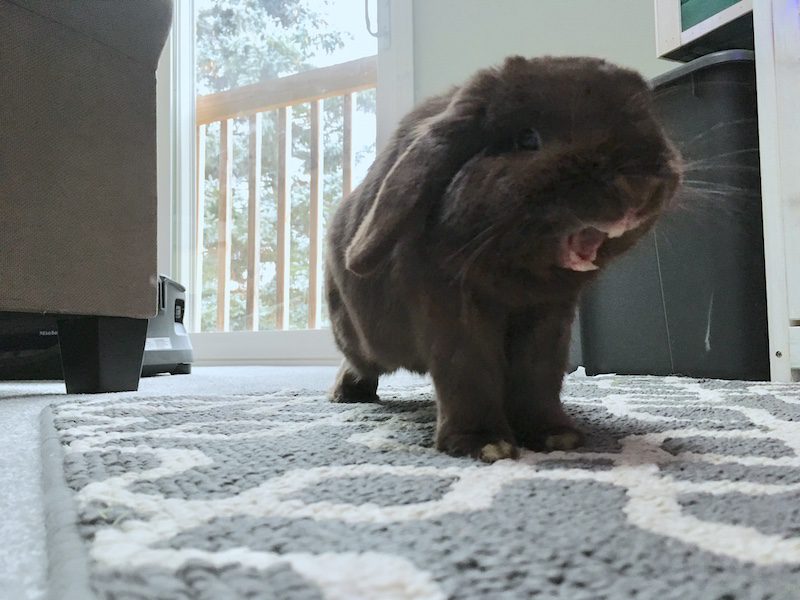
A big, toothy yawn from Lincoln!
Recent Posts
About Us
Ann Arbor Animal Hospital is a locally-owned animal hospital operating for over 90 years in Ann Arbor, MI.
